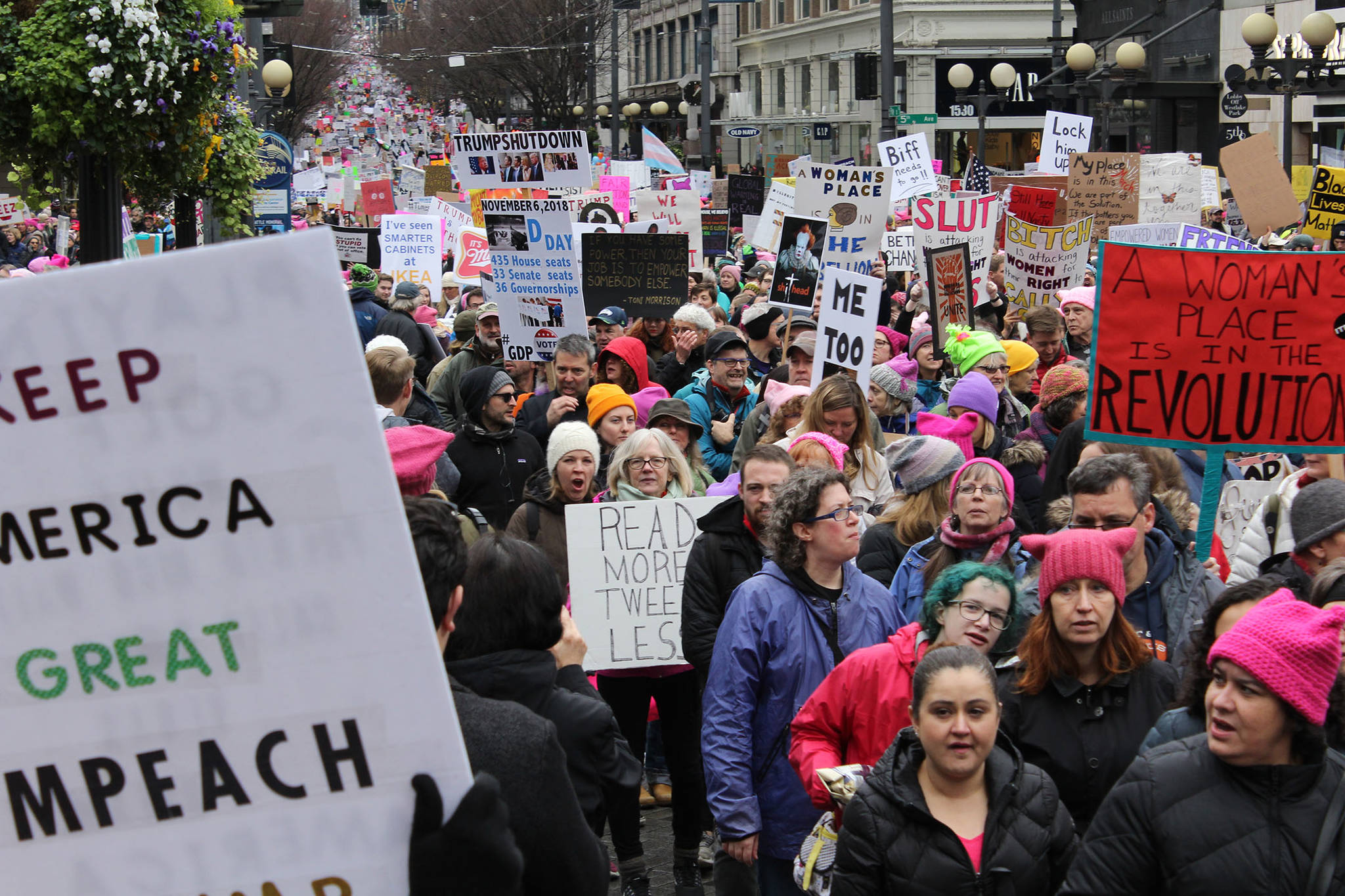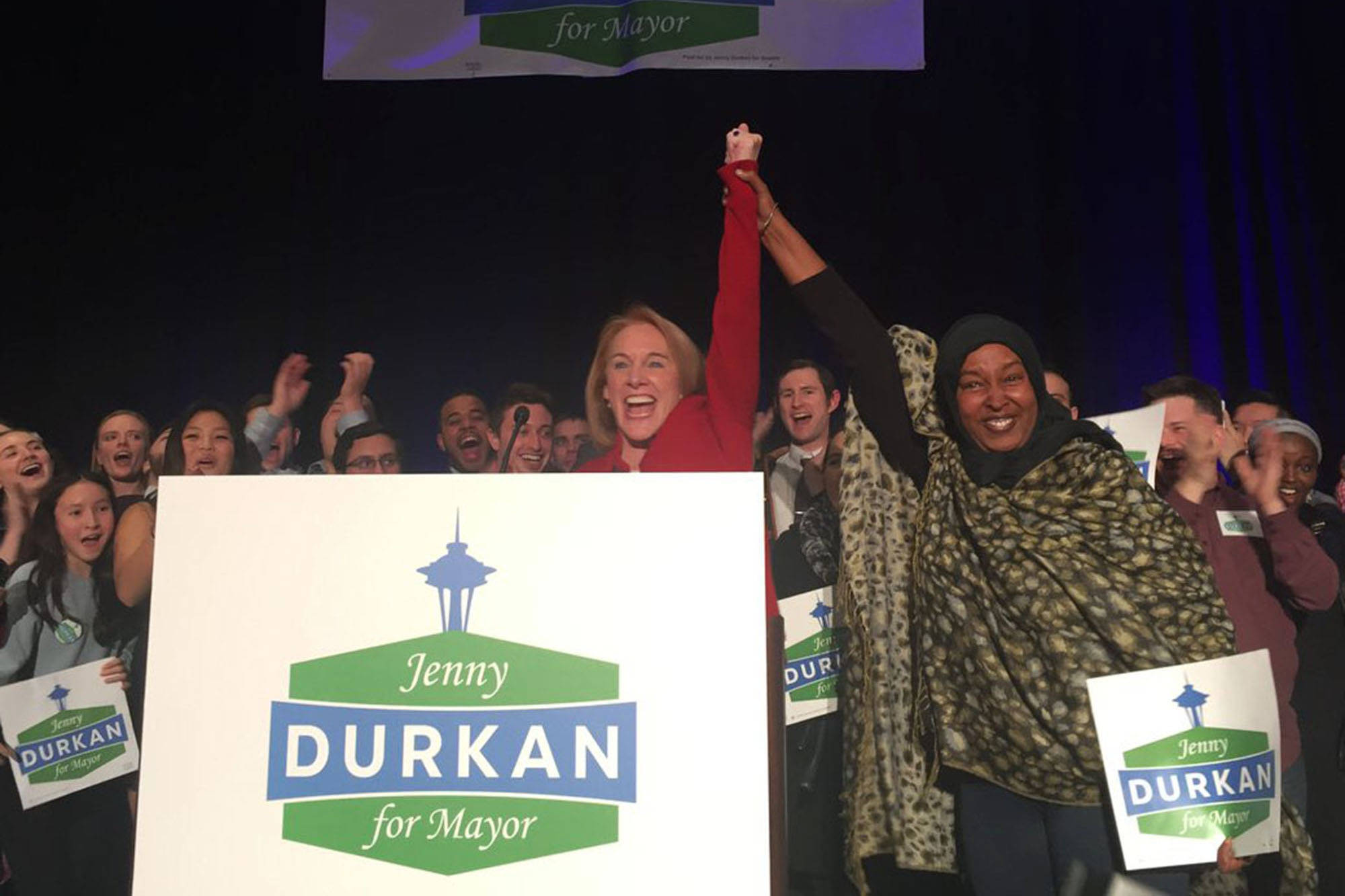President Trump’s inauguration felt like a personal insult to Asha Mohamed, a 40-year-old Somali-American heavily involved in Seattle’s American Muslim community. She was shocked that a man who “bragged openly about sexual assault and was spewing vile things in every shape and form” was elected instead of a woman. The election results made the 22-year Seattle resident feel unsafe as an immigrant, a woman, and a mother with black sons.
So Mohamed did what she’s wont to do in the face of adversity: she took to the streets in grassroots protest. The day after President Trump’s inauguration, Mohamed had an out-of-body experience as she looked upon the thousands of women and men marching through Seattle during the 2017 Women’s March. Although a note of sadness hung in the air, it was punctuated by a quiet resilience that permeates throughout times of shared mourning.
That day, Mohamed met so many women. Women who were so incensed that they had decided to run for public office. Young women in their 20s who had never been politically active, but told her that they had resolved to change that. Older women who shared the disbelief that they were still fighting for access to equal rights.
“The Women’s March … highlighted for me personally that I could not look away anymore. Politeness was condoning violence,” Mohamed said. The march made her more resolved than ever to spread understanding with the aim of creating a better tomorrow. “For me, it was those type of conversations, those type of connections [where] you could see there was a wound and we collectively needed to heal.”
A year later, much has changed in Mohamed’s life. Although she’s always considered herself an activist, Mohamed says she’s become more intentional about creating space for a new generation of activists to carry the torch. “I wear many many scarves. In America, people like to say I wear many hats,” Mohamed joked. She’s not wrong. In between raising children, working as a Program Manager at King County Department of Community and Human Services, and the co-chairing Cherry Street Mosque, Mohamed has also canvassed for several political campaigns and formed her own local movements.
At the Seattle Women’s March 2.0 last Saturday, Mohamed joined over 100,000 people on the anniversary of an inauguration that spurred many into political action. This year, Mohamed and other attendees said they were all the more resolved to put words into action, but acknowledged that there was still work to be done.
Mohamed started organizing soon after last year’s Women’s March. When she heard that a Somali acquaintance with a green card was deported on the way back to Seattle just a week after the inauguration, she was dumbstruck. “It not only hit close to home, but what I knew is that we have entered a new time,” said Mohamed. She soon learned that her acquaintance had been targeted by the nationwide ban of refugees and immigrants from seven predominately Muslim countries. Despite having weathered the Islamophobia that arose shortly after the September 11 attacks, this level of fear felt new. “It was not anything that we’d ever experienced,” she said.
Riding the momentum of the Women’s March, Mohamed called on the people she had met at the march and in the American Muslim community to mobilize. She took to Facebook, calling on the 13,000 global followers she’s garnered as the host of a Sunday Facebook Live Chat, to disseminate information. Just a day after learning about Trump’s first travel ban on January 27, she’d helped to bring 500 people together to shut down Seattle-Tacoma International Airport.
“I think that one of the things that I realized with the Women’s March is that we get comfortable as activist leaders to speak for people,” Mohamed said. “People can speak for themselves and we should provide a venue for them … the Women’s March taught me, it’s time to pass the mic.”
Her goal of creating spaces for others led Mohamed to create Women in Action, an empowerment group for women. Mohamed noticed that many of the activists engaged in the so-called Muslim Ban protest were younger women who were afraid of public speaking. Together with members of the Cherry Street Mosque, Mohamed co-founded the group which holds meetings on Fridays and Saturdays at the center. She invited women she met through the Women’s March and others in the American Muslim community to train younger women in public speaking, podcasting, and writing blogs.
Mohamed’s passion for elevating others continued during the summer as she phone banked and knocked on doors for four political leaders throughout the Puget Sound area. But her heart and soul was behind Jenny Durkan, who she supported because “she’s very action oriented, we share that.” Mohamed lunged headfirst into canvassing for Durkan: discussing her platform with others in the American Muslim community, speaking at community forums, and appearing in commercials. Laughing, she added, “I don’t know where I get the energy.”
Mohamed found the time to juggle multiple political campaigns despite shouldering hardships in her own life. In mid-July, she and her family were traveling back to Seattle from Somalia when she was pulled out of line at Dubai International Airport and immediately flown to Los Angeles separately from her family. At first, Mohamed thought it was a mistake, but soon her phone was confiscated and she was detained in a cold, empty room in Los Angeles International Airport for three days. All the while, she said her inquiries about her detainment went unanswered. A TSA member later told her after her release that they needed to confirm her identity because the the chip on her passport was unreadable. “These new policies that are happening with the Trump nation … they are done hastily without recognizing the implication and the impact it has on real people.” Devastated and afraid, Mohamed thought that she might never see her family again. Her voice lowered as she shared that “It was the most inhuman, undignified experience.” But it made her more resolved to inform the community of what she found to be unjust policies.
To help others avoid similar situations, Mohamed helped create a hotline for people being questioned by federal law enforcement a few months later. Callers are connected to attorneys and advocates who inform them of their legal rights. Then she joined De-Escalate Washington in the fall to encourage de-escalation training for police.
Her efforts paid off in November when Durkan was elected the first female mayor of Seattle in nearly a century.
On election night, Mohamed stood among a line of supporters on stage as they prepared for Durkan to deliver her speech. It was an emotional night that re-instilled a sense of Americanness that Mohamed said she’d lost after Trump’s election. Durkan embraced Mohamed on stage and whispered into her ear, “This is not my victory, this is our victory.” The words flooded over her like a long-awaited reprieve as Mohamed burst into tears. “If my country betrayed me, my city didn’t,” she explained.
Last year was a series of highs and lows for Mohamed, just as it was for many in the American Muslim community. But if 2017’s march taught her anything, it was to continue fighting to help others speak for themselves. Over the past few months, Mohamed helped organize the Cherry Street Mosque contingent of the Seattle Women’s March 2.0.
The Missing and Murdered Indigenous Women Washington led the march from Cal Anderson Park to Seattle Center, followed by the American Muslim Community. This year differed from last year’s event due to a focus on the #MeToo movement and marginalized communities. “We wanted to make sure their voices were heard,” said Seattle Women’s March 2.0 organizer and Be the Change Network member Ali Lee. Assuming there will be a Women’s March 3.0, Lee hopes that the next edition will focus more on incorporating the voices of women with disabilities.
As a speaker for the march this year, Mohamed shared her views on the necessity of activism with the gathered masses at Cal Anderson Park. Dressed in a colorful hijab and a black down coat, Mohamed was joined on stage by her daughter and grandmother. “Solidarity and action is not a noun, but a verb,” Mohamed said to the applause and cheers of thousands of spectators.
In typical Mohamed fashion, she amped up the crowd and then paused for a moment before shouting, “So, I am going to step back for the future: my daughter.”
Mohamed’s daughter sauntered up to the microphone, taking the place of her mother. As her daughter spoke about the need to support marginalized communities, Mohamed stood behind her with her fist raised in solidarity.
mhellmann@seattleweely.com
Correction: A previous version of this article stated that Asha Mohamed was a Seattle Women’s March 2.0 organizer, when she in fact organized a contingent of the Seattle Women’s March. It has been corrected.









